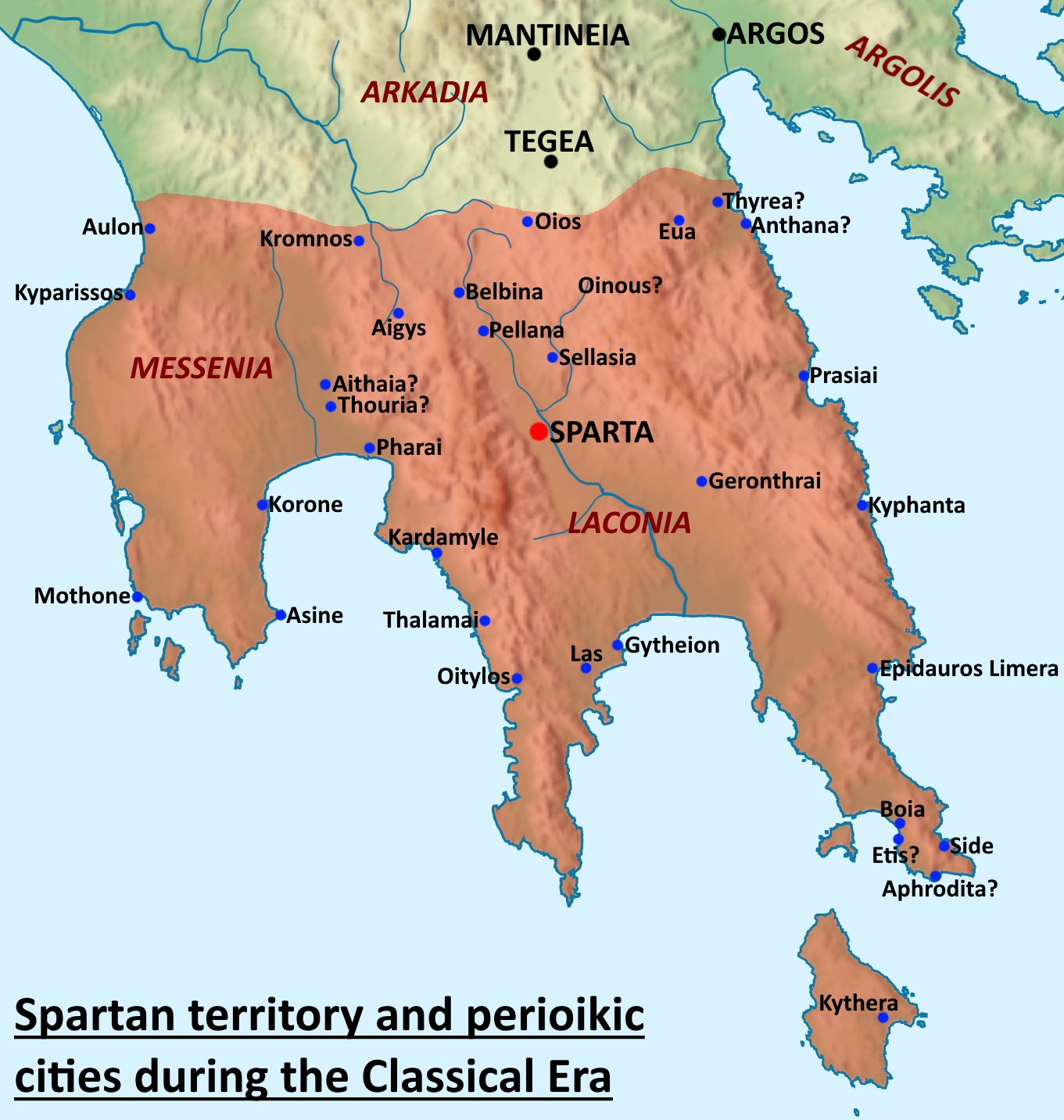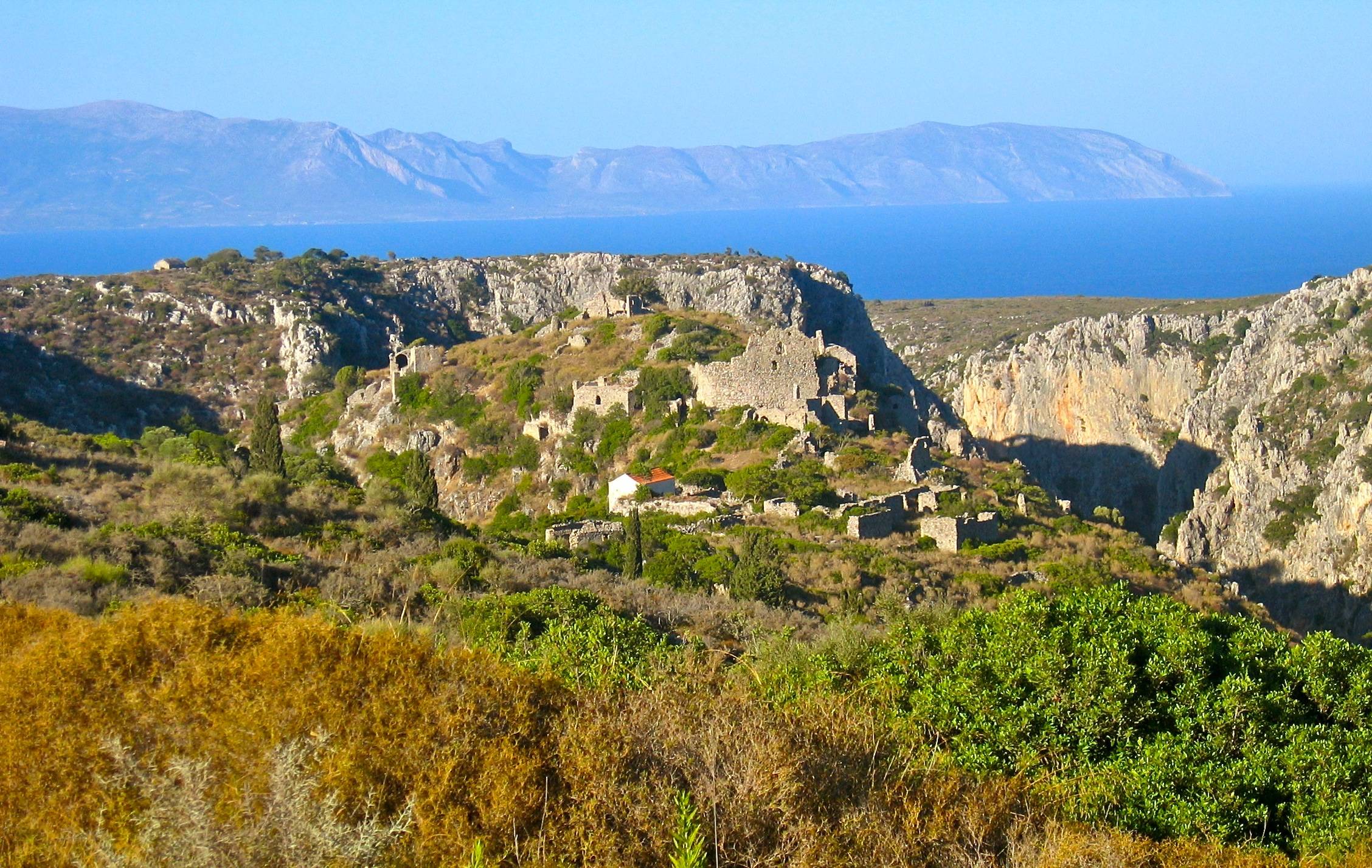|
Harmost
Harmost () was a Spartan term for a military governor. The Spartan general Lysander instituted several harmosts during the period of Spartan hegemony after the end of the Peloponnesian War in 404 BC. They were sent into their subject or conquered towns, partly to keep them in submission, and partly to abolish the democratic form of government, and establish oligarchies instead. Although in many cases they were ostensibly sent for the purpose of abolishing the tyrannical government of a town and restoring freedom, they were accused of acting like kings or tyrants themselves, such that the grammarian Dionysius thought that harmost was merely another word for "king". In the peace of Antalcidas the Lacedaemonians pledged to reestablish free governments in their subject towns, but they nevertheless continued to install harmosts in them. Even Xenophon, generally pro-Spartan, censured the Spartans for the manner in which they allowed their harmosts to govern. It is uncertain how l ... [...More Info...] [...Related Items...] OR: [Wikipedia] [Google] [Baidu] |
Spartan Hegemony
Spartan hegemony refers to the period of dominance by Sparta in Greek affairs from 404 to 371 BC. Even before this period the polis of Sparta was the greatest Spartan army, military land power of classical Ancient Greece, Greek antiquity and governed, dominated or influenced the entire Peloponnese. The defeat of the Athenians and the Delian League in the Peloponnesian War in 431–404 BC resulted in a short-lived Spartan dominance of the southern Greek world from 404 to 371 BC.Jones, Nicholas F. ''Politics and Society in Ancient Greece.'' Westport, CT: Prager, 2008 Due to their mistrust of others, Spartans discouraged the creation of records about their internal affairs. The only histories of Sparta are from the writings of Xenophon, Thucydides, Herodotus and Plutarch, none of whom were Spartans. Plutarch was writing several centuries after the period of Spartan hegemony had ceased. This creates difficulties in understanding the Spartan political system, which was distinctly differen ... [...More Info...] [...Related Items...] OR: [Wikipedia] [Google] [Baidu] |
Thebans
Thebes ( ; , ''Thíva'' ; , ''Thêbai'' .) is a city in Boeotia, Central Greece, and is one of the oldest continuously inhabited cities in the world. It is the largest city in Boeotia and a major center for the area along with Livadeia and Tanagra. It played an important role in Greek myths, as the site of the stories of Cadmus, Oedipus, Dionysus, Heracles and others. One myth had the city founded by Agenor, which gave rise to the (now somewhat obscure) name "Agenorids" to denote Thebans. Archaeological excavations in and around Thebes have revealed a Mycenaean Greece, Mycenaean settlement and clay tablets written in the Linear B script, indicating the importance of the site in the Bronze Age. Thebes was the largest city of the ancient region of Boeotia and was the leader of the Boeotian confederacy. It was a major rival of Classical Athens, ancient Athens, and sided with the Achaemenid Empire, Persians during the Second Persian invasion of Greece, 480 BC invasion under ... [...More Info...] [...Related Items...] OR: [Wikipedia] [Google] [Baidu] |
Military Ranks Of Sparta
A military, also known collectively as armed forces, is a heavily Weapon, armed, highly organized force primarily intended for warfare. Militaries are typically authorized and maintained by a sovereign state, with their members identifiable by a distinct military uniform. They may consist of one or more military branches such as an army, navy, air force, space force, marines, or coast guard. The main task of a military is usually defined as defence of their state and its interests against external armed threats. In broad usage, the terms "armed forces" and "military" are often synonymous, although in technical usage a distinction is sometimes made in which a country's armed forces may include other paramilitary forces such as armed police. Beyond warfare, the military may be employed in additional sanctioned and non-sanctioned functions within the state, including internal security threats, crowd control, promotion of political agendas, emergency services and reconstructi ... [...More Info...] [...Related Items...] OR: [Wikipedia] [Google] [Baidu] |
Dictionary Of Greek And Roman Antiquities
''A Dictionary of Greek and Roman Antiquities'' is an English language encyclopedia first published in 1842. The second, improved and enlarged, edition appeared in 1848, and there were many revised editions up to 1890. The encyclopedia covered law, architecture, warfare, daily life, and similar subjects primarily from the standpoint of a classicist. It was one of a series of reference works on classical antiquity by William Smith, the others covering persons and places. It runs to well over a million words in any edition, and all editions are now in the public domain. See also * ''Dictionary of Greek and Roman Geography'' * ''Dictionary of Greek and Roman Biography and Mythology'' References and sources ;References ;Sources * External links * , OCR at Ancient Library 1875 editionat LacusCurtius (about 50% of it: the Roman articles) 1890 editionat Perseus Project Also the Internet Archive The Internet Archive is an American 501(c)(3) organization, non-profit organizat ... [...More Info...] [...Related Items...] OR: [Wikipedia] [Google] [Baidu] |
Phrourarch
Phrourarch or Phrourarchos is a Greek military title, meaning garrison commander. Athenians controlled their overseas empire with the episcopi and phrourarchs. The term was widely used by the Macedonian and later Hellenistic armies. Regarding the Spartans, it is not clear if phrourarch was the specific Spartan term. Phroura (garrison) is reported to be a Spartan term for 'a small mobile or expeditionary force'.The Peloponnesian War: a military study By John Francis Lazenby Page 264 The title for the governor of the garrisoned cities under the Spartan hegemony was harmost Harmost () was a Spartan term for a military governor. The Spartan general Lysander instituted several harmosts during the period of Spartan hegemony after the end of the Peloponnesian War in 404 BC. They were sent into their subject or conquer .... References *From Cyrus to Alexander By Pierre Briant, Eisenbrauns Page 75 *The administration of the Ptólemaic possessions outside Egypt By Roger S. Bagnall ... [...More Info...] [...Related Items...] OR: [Wikipedia] [Google] [Baidu] |
Epistates
An (; plural ) in ancient Greece was any sort of superintendent or overseer. In the Hellenistic kingdoms generally, an is always connected with a subject district (a regional assembly), where the , as resident representative of the king, exercised control and collected taxes. Military use In military texts, an (the one who stands behind) is the man behind a '' protostates'' (the one who stands first). The phalanx was made up of alternate ranks of and . Thus, in a file of eight men, the were the men in positions 1, 3, 5, and 7, while the occupied positions 2, 4, 6, and 8.Arr.Tact.6.6 New Testament usage The word is also used in "common" Koine Greek and in the Greek New Testament to refer to Christ. This word is translated into English as 'master,' but that is a simplistic translation. The word might be better understood as belonging to the set of Greek words meaning 'visitor' or 'divine visitation' (), 'letter of instruction' (), as well as 'guardian' or 'caretaker' (), w ... [...More Info...] [...Related Items...] OR: [Wikipedia] [Google] [Baidu] |
Episcopi
''Episkopoi'' (, sing. , ''episkopos'', literally "overseer"), Latinized ''episcopus''/''episcopi'', were inspectors who were sometimes sent by the Athenians to subject states. Harpocration compares them to the Lacedaemonian harmosts, and says that they were also called ''phylakes'' (φύλακες, "guardians"). It appears that these ''episkopoi'' received a salary at the cost of the cities over which they presided. The term was used in early Christianity to refer to overseers of local churches. It has often been translated as "overseers," "pastors," "shepherds," or "bishops." See also *Bishop *Epistates An (; plural ) in ancient Greece was any sort of superintendent or overseer. In the Hellenistic kingdoms generally, an is always connected with a subject district (a regional assembly), where the , as resident representative of the king, exerci ... References *Aristoph. Aves, 1022, &c., with Schol.'; *Harpocrat. s. v. ; Bockh, Publ. Econ. of Athens^ pp. 156, 238j 2d e ... [...More Info...] [...Related Items...] OR: [Wikipedia] [Google] [Baidu] |
Perioeci
The Perioeci or Perioikoi (, ) were the second-tier citizens of the ''polis'' of Sparta until 200 BC. They lived in several dozen cities within Spartan territories (mostly Laconia and Messenia), which were dependent on Sparta. The ''perioeci'' only had political rights in their own city, while the course of the Spartan state exclusively belonged to Spartan citizens, or Spartiates. The name ''perioeci'' roughly means "those dwelling around/nearby", deriving from , ''peri'', "around", and , ''oîkos'', "dwelling, house". ''Perioeci'' and Spartans were collectively called the ''Lakedaimonians''. They had a central role in the Spartan economy, controlling commerce and business, as well as being responsible for crafts and manufacturing, including producing the weapons and armour of the Spartan army, as the higher-ranking Spartan citizens considered all commercial and money-making activities to be unworthy of them. The ''perioeci'' were also the only people allowed to freely travel o ... [...More Info...] [...Related Items...] OR: [Wikipedia] [Google] [Baidu] |
Pindar
Pindar (; ; ; ) was an Greek lyric, Ancient Greek lyric poet from Thebes, Greece, Thebes. Of the Western canon, canonical nine lyric poets of ancient Greece, his work is the best preserved. Quintilian wrote, "Of the nine lyric poets, Pindar is by far the greatest, in virtue of his inspired magnificence, the beauty of his thoughts and figures, the rich exuberance of his language and matter, and his rolling flood of eloquence, characteristics which, as Horace rightly held, make him inimitable." His poems can also, however, seem difficult and even peculiar. The Athenian comic playwright Eupolis once remarked that they "are already reduced to silence by the disinclination of the multitude for elegant learning". Some scholars in the modern age also found his poetry perplexing, at least until the 1896 discovery of some poems by his rival Bacchylides; comparisons of their work showed that many of Pindar's idiosyncrasies are typical of archaic genres rather than of only the poet himsel ... [...More Info...] [...Related Items...] OR: [Wikipedia] [Google] [Baidu] |
Cythera (island)
Kythira ( ; ), also transliterated as Cythera, Kythera and Kithira, is an island in Greece lying opposite the south-eastern tip of the Peloponnese peninsula. It is traditionally listed as one of the seven main Ionian Islands, although it is distant from the main group. Administratively, it belongs to the Islands regional unit, which is part of the Attica region, despite its distance from the Saronic Islands, around which the rest of Attica is centered. As a municipality, it includes the island of Antikythera to the south. The island is strategically located between the Greek mainland and Crete, and from ancient times until the mid-19th century was a crossroads of merchants, sailors, and conquerors. As such, it has had a long and varied history and has been influenced by many civilizations and cultures. This is reflected in its architecture (a blend of traditional, Aegean and Venetian elements), as well as the traditions and customs, influenced by centuries of coexistence of ... [...More Info...] [...Related Items...] OR: [Wikipedia] [Google] [Baidu] |



